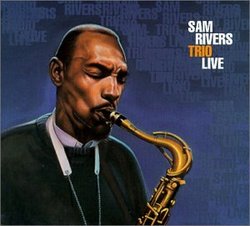| All Artists: Sam Rivers Title: Live Members Wishing: 0 Total Copies: 0 Label: Grp Records Release Date: 10/6/1998 Album Type: Live Genres: Jazz, Pop Styles: Avant Garde & Free Jazz, Modern Postbebop, Bebop Number of Discs: 1 SwapaCD Credits: 1 UPCs: 011105026826, 011105126823 |
Search - Sam Rivers :: Live
 | Sam Rivers Live Genres: Jazz, Pop
|
Larger Image |
CD Details |
CD ReviewsSam Rivers is the Mississippi of Jazz Derek Taylor | Madison, WI | 10/12/1998 (5 out of 5 stars) "Previously the only record of Rivers' early 70's Impulse trio sessions available on compact disc was STREAMS (now deleted?). Through a resurgence of re-issues & new releases & a heavy touring schedule Samuel Cawthorne Rivers is finally receiving his due place in the jazz pantheon after years of mainstream critical ambivalence and ignorance. This album is evidence of his enormous stature. TRIO-LIVE follows the same basic format of STREAMS, featuring a series of Rivers' improvisations on tenor & soprano saxophones, flute, piano and primitve vocalese backed by the able & active support of Barry Altschul (a vast improvement over the clumsy traps-work of a pre-disco Norman Conners on STREAMS) & at various times Cecil McBee, Arlid Anderson & Lewis Worrell on double-bass. Each of the tunes are lengthy improv numbers with Rivers' punctuating his shifts among his arsenal of instruments with raucous howls & whoops. Rivers manages to touch upon the whole history of improvised musical expression, from passionately simple cathartic screams, to incredibly intricate runs of saxophonic genius that utilize all registers of his horn. This is a highly kinetic set that never slows down even during the more meditative passages when Rivers blows soulfully on his flute. A beautiful taste of the early 70's loft jazz esthetic." The Master at work nadav haber | jerusalem Israel | 04/22/2002 (5 out of 5 stars) "In the attached linear notes, Rivers says two super important things: 1.You can't last on spontaneity alone - you must develop your knowledge if you want to last. 2.Rivers listened to whatever everybody else was playing - so he can avoid playing like anyone else but himself.This CD shows Rivers to be an amazing spontaneous improviser, a knowledgable theoretician, a master of structure and sound, and one of the most versatile saxophone players I have ever heard. First - his sound on tenor does not resemble either Coltrane, Rollins, Gordon, or anyone else. His control of the high and low registers is unparalelled. On the soprano I find him to be even stronger than Coltrane - and I dont mean to take anything away from Trane by that. Rivers abilty to sustain both energy and interest in long solos is admirable. His tenor playing on the Molde suite is one of the high points of creative Jazz as far as I am concerned. I was surprised to hear Rivers play the piano beautifully (on track 2), and less surprised to hear his great flute playing. This CD is definately the best trio performance I know of, as the rest of the group provides Rivers with sympathetic support.Rivers has been a giant of American music for the past 25 years but has not enjoyed wide or even mediocre recognition. This is not something the general public should be proud of." Pure improvisational genius R. Hutchinson | a world ruled by fossil fuels and fossil minds | 06/15/2000 (5 out of 5 stars) "Sam Rivers is going on 80, and is finally getting some long overdue public recognition for what his fellow musicians have always known -- he is a master of his craft. These trio recordings from 1973 are Rivers at his finest, as he moves from tenor to soprano sax, piano, and wordless vocals. The drums and bass are absolutely outstanding throughout -- it is truly telepathic engagement. Rivers' great '60s Bluenote records are currently available only as a Mosaic box (well worth looking for!), and need to be reissued so Sam can continue to reach the listeners now hearing his big band compositions and these searingly brilliant improvisations from the days before the deadly neoclassical "impulse" set in like a toxic cloud over the ever-searching essence of jazz!"
|

 Track Listings (5) - Disc #1
Track Listings (5) - Disc #1